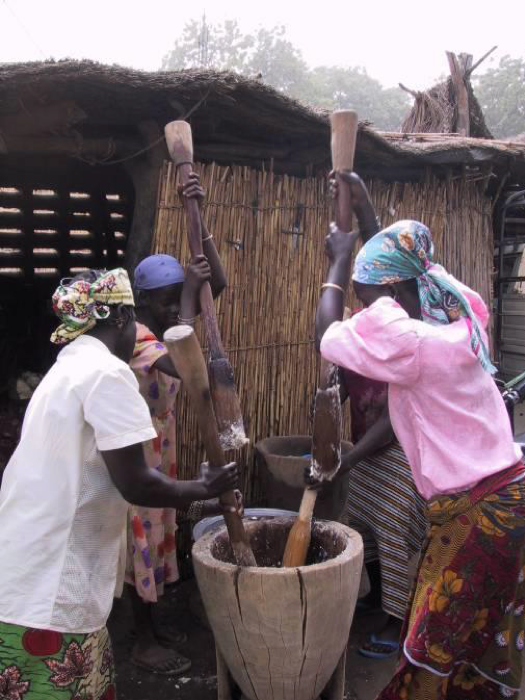First published on 01/11/2014, and last updated on 03/11/2018
By: Vanessa Reid (Honorary member)
In August 2013, Consortium Member Global Diversity Foundation (GDF) held the Global Environments Summer Academy (GESA) in Bern, Switzerland. The academy brought together twenty individuals from around the world, ranging from PhD candidates to young professionals working in the field of environmental and social change. Among them, Vanessa Reid (Consortium Honorary member and previously Communications Officer), Yuki Yoshida (GDF) and Kaylena Bray (Cultural Conservancy) decided to develop the Wellbeing Initiative, with food, and food sovereignty, at its core. Throughout GESA, questions around food and well-being (which were not straight-forward to answer, often with complex and subtle narratives) kept emerging, hence why the initiative came into being and was catalysed by questions like:
What role does the global food system of production, distribution, and consumption play in human well-being?
Are we connected to the food we eat, the hands that grew it and the land that produced it, or is the current, and pervasive commercial food system only adding to a sense of anonymity and unaccountability within this daily exchange?
Does the food we eat reflect our political orientations and our social and environmental ethics, or exactly the opposite?
In an effort to understand the diversity of the food sovereignty movement and its political, social and economic ramifications, Vanessa, Yuki and Kaylana, along with GDF staff Susannah McCandless and Emily Caruso, decided to turn these discussions into something tangible and quantifiable, and thus set up the initiative. One of its key functions is to provide an on-line platform for information and resource sharing of the team’s case study research, as well as sharing resources and content from networks, individuals and institutions working towards a shared vision of food sovereignty. The web platform will eventually gather and share case studies of wider wellbeing initiatives – stepping beyond the issue of food. The team have already begun carrying-out case study research that explores commonalities and differences between diverse social, economic, and cultural approaches to food sovereignty, examining how they are redefining the current food paradigm and what ‘food sovereignty’ means in practice in different contexts. Each member of the team is backed by the NGOs they work with/are affiliated to, which support the initiative (in-kind, with expertise and advice). The team are fortunate enough to have Michel Pimbert, Consortium Honorary member and Director at the Centre for Agroecology and Food Security at the University of Coventry as a mentor and advisor throughout the process. Thanks to funds from the GESA Alumni Seed Fund, they have begun their research and started to visit case study sites. The team plans to attend the International Society of Ecological Economics in Iceland in the summer of next year – to present a synthesis of initial findings from their initiative, whilst highlighting achievements and limitations within the food sovereignty movement at large.
The initiative is inspired by the wider, transnational global agrarian food sovereignty movement that proposes an alternative food paradigm, creating practical, sustainable and democratic alternatives to the current and pervasive industrialised food model. Contrary to the dominant capitalist framework of food production and distribution, food sovereignty is premised on the view that our food system must feed our global population in a way that is equitable and sustainable with its control and management coming democratically from civil society. In this way, the movement seeks to build local market exchanges and re-localize decision-making processes, challenging neo-liberalism in favour of diverse means of engaging in agricultural production, and empowering small-scale producers as powerful economic actors in trade markets.
The Wellbeing Initiative falls under a wider framework – based on the Indian notion of swaraj or self-rule – known as the Radical Ecological Democracy (RED) currently co-led by Ashish Kothari, founder of Indian NGO Kalpavriksh (Consortium Member) and co-founder of the Consortium. Ashish is also an advisor and mentor to the team, providing critical insights and a wealth of resources for developing our methodological framework. The RED framework – a Consortium supported initiative – focuses on meeting human needs and aspirations of well-being through direct or radical democracy, localized economies embedded in ecological and cultural landscapes, notions of human well-being that relate to actual needs of people and to qualitative values like satisfaction and social security, democratic knowledge and technology generation, and sustaining cultural diversity and exchange. It proposes a mix of localization and globalisation, the former providing communities essential control over means of production and consumption, the latter affording possibilities of intercultural exchange and mutual learning. It is intended that findings from the Wellbeing Initiative will feed-in to the wider RED movement.
